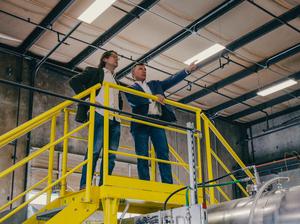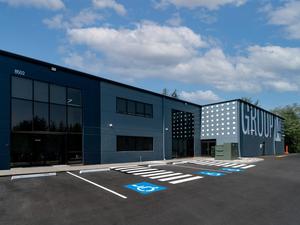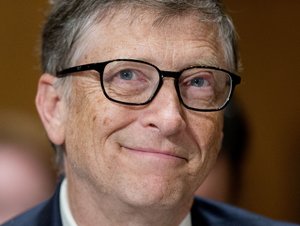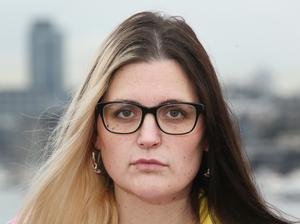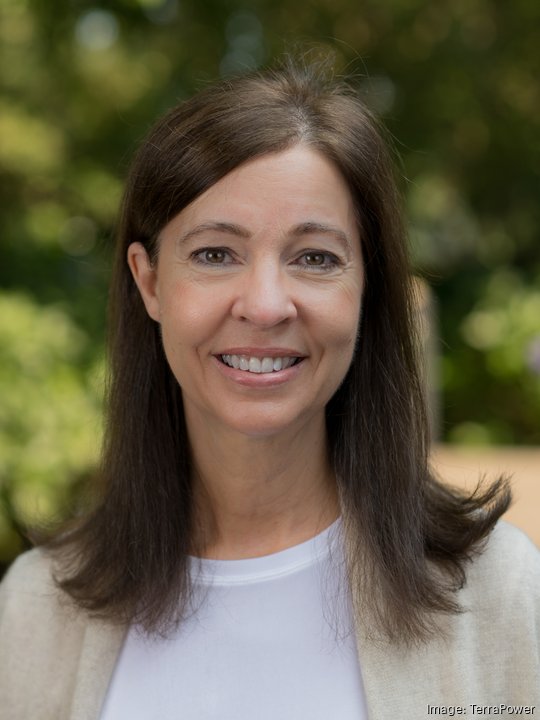
TerraPower is targeting lofty goals, and the Bellevue-based nuclear power company certainly has the war chest to support itself.
TerraPower, which was co-founded by Microsoft co-founder and billionaire Bill Gates, in August announced a $750 million funding round, but TerraPower Chief Financial Officer Marcia Burkey said the round has now grown to $830 million. The funding will support a variety of company projects, including energy storage and cancer treatments.
“We’re trying to make nuclear better in ways that we feel has held it back,” Burkey said. “We want it to be predictable, affordable, simpler and even reach higher safety levels.”
Burkey said TerraPower, which launched in 2008, has more than 400 employees and could grow its headcount by 40% this year, and more than 80% of the company’s employees are based in Washington. The company has grown its footprint in Bellevue where it is headquartered. The company took over a roughly 65,000-square-foot facility in Everett three years ago and recently added a separate roughly 60,000-square-foot facility next door.
A major project for the company is thermal energy storage, which would provide clean energy on demand when sources like wind or solar aren’t available. The company is trying to demonstrate the technology at a retiring coal plant in Wyoming.
TerraPower is among the latest Seattle-area clean energy startups to raise massive funding rounds.
Woodinville-based battery technology company Group14 Technologies raised $614 million through its Series C round last year, in addition to landing $100 million from the Department of Energy. Everett-based fusion energy company Zap Energy raised a $160 million Series C round in June, while Helion, another fusion energy company based in Everett, raised a $500 million Series E round in 2021.
“I think there’s a lot of interest in getting to a carbon-free energy economy,” Zap Energy co-founder and Chief Technology Officer Brian Nelson previously told the Business Journal. “A lot of these investors, some are looking beyond the short-term gain and looking at the double-bottom line. They want to make money, but they also want to do something good for the environment.”
According to the U.S. Energy Information Administration, nuclear power in 2022 accounted for 18.2% of U.S. utility-scale electricity generation. Renewable energy accounted for 21.5%.
Nuclear fission results from splitting up the nucleus of an atom, in turn releasing heat. Nuclear power plants channel this heat to a cooling agent, often water, to produce steam and spin turbines, thereby producing electricity through a generator. These reactions require uranium-235, and because nuclear power need this rare fuel, it is not considered renewable like wind and solar power.
Despite its promise, opponents of nuclear power worry about radioactive waste, which can stay radioactive for thousands of years. This waste is often stored underground or in secure facilities. Others say that nuclear power plants take too long to build, are too expensive and don’t make enough of an impact on our carbon footprint. The environmental group Greenpeace notes recent models indicate doubling global nuclear power capacity by 2050 would only bring down greenhouse gas emissions by about 4%.
TerraPower is developing a nuclear reactor that runs at a higher temperature, making it more efficient than traditional reactors, according to the company, and its medical isotopes program is aimed at fighting cancer.
Gates, who serves as chairman of TerraPower’s board, co-led the massive round last year with SK Inc. and SK Innovation, subsidiaries of the South Korean conglomerate SK Group. SK Innovation is focused on energy and chemicals, while SK Inc. is the investing arm of SK Group.
Additional investors include XCarb Innovation Fund, the investing arm of steel company ArcelorMittal, and Korea Shipbuilding and Offshore Engineering, the holding company of Hyundai Heavy Industry Group’s shipbuilding sector.
TerraPower’s Wyoming reactor project is also one of two initiatives the Department of Energy is deploying a total of $2.5 billion toward as part of the Advanced Reactor Demonstration Projects. The government award requires a 50% match of project costs up to $2 billion, and TerraPower said in its announcement of the $830 million round that it “contributes materially to the many elements that are required for successful deployment of innovative technologies.”
Burkey said the U.S. has done a good job with nuclear energy and that this power is affordable, but much of the innovation in nuclear has come out of Russia. She added that U.S. utility providers want to adopt renewables but tell TerraPower a key concern is being able to load power for when renewables aren’t available.
“Most of us don’t want intermittent power. We want power whenever we need it,” Burkey said. “We’re going to be producing power all the time. ... That is a real game-changer in nuclear.”
